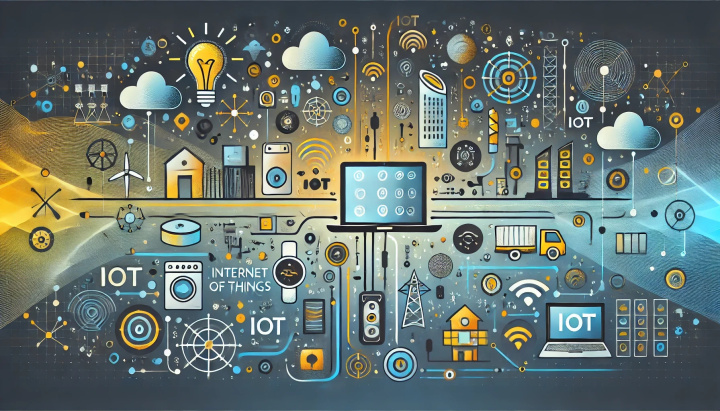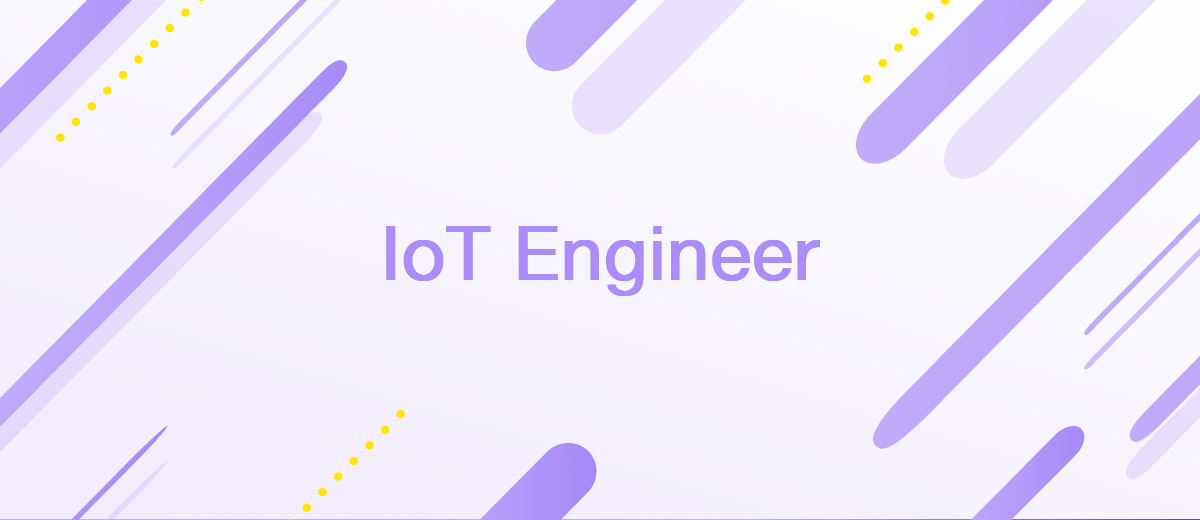IoT Engineer: Key Skills and Responsibilities
The Internet of Things (IoT) has opened up new horizons for human interaction with technology, connecting many physical objects to the network. Today, IoT technologies are being implemented in all areas of life – from smart homes and medicine to industry and transport, creating a huge demand for qualified specialists. In this article, we will tell you what an IoT engineer does in detail, what skills they need and what tools they use, as well as their career prospects and the average IoT engineer salary in 2024.
What is an IoT Engineer
An IoT engineer is a specialist who designs, develops, implements, and maintains systems and devices connected to the Internet of Things (IoT). Their work covers hardware components, software, network protocols, and security issues, as well as the integration of all these elements into a single system.
The main task of an IoT engineer is to create reliable interaction between physical devices and the digital environment. This includes ensuring stable operation of devices, their security, scalability, and usability. To successfully perform their duties, an IoT engineer must have knowledge in areas such as electronics, programming, networking, and cybersecurity.

Today, IoT engineers can specialize in various areas depending on their area of professional interest and skills. The main specializations include:
- IoT hardware engineer. They design, develop, connect, and configure hardware components for IoT devices. Their responsibilities include selecting and integrating sensors, processors, and network modules that effectively receive, process, and transmit data. These specialists require skills in designing electronic circuits, creating and testing equipment prototypes.
- Embedded systems engineer. Specializes in developing embedded software, which is key to the operability of IoT devices. This specialist must understand microcontrollers, sensors, and actuators, and be able to optimize software to work in resource-constrained conditions.
- IoT network engineer. They are responsible for designing and configuring the network infrastructure required to connect devices and exchange data between them. Such an engineer develops wired and wireless networks (Wi-Fi, Bluetooth, LoRaWAN, Zigbee) and ensures their stable operation.
- IoT security engineer. This specialization focuses on protecting IoT devices, software, and networks. A security engineer develops security protocols, eliminates vulnerabilities, and implements encryption and access control technologies to prevent threats and attacks.
- IoT data engineer. Responsible for processing, storing, and analyzing data generated by IoT devices. This engineer develops and maintains data pipelines and extracts valuable insights to improve device performance and user experience.
Main Responsibilities of an IoT Engineer
An IoT engineer plays a vital role in integrating physical devices into the digital environment, creating solutions that make IoT technologies accessible and effective. To successfully implement projects in the field of the Internet of Things, they perform a number of key tasks aimed at creating and supporting reliable, secure, and functional systems. The main responsibilities described in the IoT engineer job description include the following:
- Designing, developing, and implementing IoT systems and devices. Connecting and configuring hardware components (sensors, actuators) and integrating them with software and networks.
- Building and maintaining IoT architectures. This includes ensuring seamless and secure data exchange between devices and platforms.
- Development of software and firmware. Support for functionality and interconnection of devices in the IoT environment.
- Testing and validation of IoT systems. Ensuring reliability, stability, and security, as well as identifying and eliminating technical problems.
- Monitoring the performance of equipment and software. Introducing current updates and settings into their hardware and software.
- Development and deployment of cloud systems and applications. Collection, storage, analysis, and management of data obtained through Internet of Things devices.
- Research and development (R&D). IoT engineer jobs involve studying new technologies, methodologies, and solutions in this area for their subsequent implementation in IoT projects.
- Providing technical support and developing documentation. Preparing technical specifications, user manuals, and other documentation for IoT systems and devices.
- Collaborate with cross-functional teams. Work with data engineers, product managers, hardware engineers, customers, and other stakeholders.
Essential Skills and Competencies
In the profession of an IoT engineer, not only is technical knowledge important, but also personal qualities that are necessary for the successful completion of tasks. As in other IT specialties, these competencies can be divided into two main categories: hard and soft skills. Mastering IoT engineer skills in both areas enables a specialist to effectively develop and implement complex systems, as well as collaborate in an interdisciplinary team. The ability to combine technical expertise with communication skills plays a key role in the successful career of an IoT engineer.


Hard Skills
Hard skills are the technical skills required to perform specific tasks related to the design, development, and implementation of IoT solutions. To effectively perform their work, an IoT engineer must have knowledge in a number of key areas:
- Programming and data engineering: knowledge of programming languages C, C++, Python, and Assembly, as well as skills in working with APIs and middleware for developing embedded and external software.
- Machine learning and data analytics: ability to develop and implement machine learning models to collect and analyze data and extract valuable insights from the collected information.
- Hardware: knowledge of working with electronic circuits, sensors, processors, actuators, and other components of IoT devices.
- Network infrastructure: experience with modern network and communication protocols such as Bluetooth, Bluetooth Low Energy (BLE), Wi-Fi, Ethernet, RF (LoRa, RFID), ZigBee, HTTP, CoAP, XMPP, and MQTT.
- Cloud services and databases: work with cloud platforms, SQL, and NoSQL databases for efficient data exchange and synchronization in real time.
- Cybersecurity: knowledge of the basics of protecting IoT systems from attacks, unauthorized access, and data theft.
Soft Skills
For an IoT engineer, it is not only technical skills that are important, but also personal qualities that help to effectively interact with colleagues and clients and solve non-standard problems. In the field of the Internet of Things, where innovations and technological changes occur quickly, it is important to be flexible, adaptable, and able to work in a team. Here are some of the key soft skills for specialists in this field:
- Effective communication: the skill to communicate clearly and competently to colleagues and clients, and to perceive it correctly.
- Critical thinking: the capacity to analyze and evaluate different approaches to solving a problem and choose the most effective one.
- Flexibility and adaptability: the ability to quickly respond to changes and work effectively in conditions of uncertainty and instability.
- Time management: the competence to plan and use your time effectively to complete tasks.
- Emotional intelligence and empathy: the ability to understand and manage your own emotions, as well as recognize the emotions of others, which is important for productive teamwork.
- Customer-centric thinking: the approach of considering customer needs and focus on their requests when developing and implementing solutions.
Popular Tools and Technologies in IoT
To effectively develop and manage systems, an IoT software engineer uses a wide range of software tools and technologies. They cover all stages of working with the Internet of Things, from cloud platforms for managing devices to tools for ensuring security. Knowledge and experience with them allow engineers to create flexible, reliable, and scalable solutions for connecting devices and processing data.
The most popular technologies used on the Internet of Things are:
- AWS IoT Core. It is a cloud service that efficiently manages billions of connected devices and enables their interaction with each other and software. The platform collects, stores, transmits, and analyzes trillions of messages in real time.
- Microsoft Azure IoT Hub. It is a cloud platform that provides scalable services for managing IoT systems. It enables fast and reliable two-way communication between Internet of Things devices and cloud applications.
- MQTT. It is a standard OASIS messaging protocol widely used in the IoT field. The technology is ideal for transmitting data between remote devices with a small amount of code and minimal network bandwidth.
- CoAP. It is a specialized Internet protocol for connecting low-power devices to IoT systems over networks with limited bandwidth. It is used as an alternative to MQTT.
- Arduino. It is a major supplier of hardware and software for the IoT market. It offers an open-source prototyping platform, the Arduino IDE, and a platform for exchanging and collecting data from IoT devices, the Arduino Cloud. It also provides the IoT Cloud Remote app for developing control panels for connected devices.
- Tableau. It is a popular platform for collecting, visualizing, and analyzing data in IoT systems. It allows you to better understand and use it.
- Armis. It is an important platform that ensures the cybersecurity of IoT-connected equipment and software. It contains tools for recognizing and countering threats, assessing risks, and managing them.
- GitHub. It is one of the leading platforms for hosting and collaborating on IoT software development, deployment, and version control.
Demand for IoT Engineers

The importance of IoT engineer has increased significantly today. This is a very popular profession in 2024, which is in high demand in many industries. It is most in demand in the following areas:
- Industry. IoT engineers bring significant benefits to industrial enterprises by implementing the latest digital technologies into their work processes. They launch automation and analytics systems, as well as all kinds of sensors and controllers to connect equipment to the network.
- Medicine. IoT engineers develop and implement network-connected medical devices and remote patient health monitoring systems, as well as wearable devices. In addition, they integrate them with electronic databases of medical institutions to integrate or align data.
- Consumer goods. IoT engineers play a key role in developing, updating, and maintaining connected electronics and home appliances. This includes home automation systems (smart home), wearables, and smart devices.
- Transport and logistics. These professionals are responsible for developing and configuring software for connected vehicles, optimizing supply chains, and managing fleets. They develop and integrate sensors, GPS modules, communication protocols, and other IoT equipment.
- Smart cities. IoT engineers plan and implement smart city infrastructure, including intelligent traffic management systems, environmental monitoring, energy-efficient street lighting, and more.
How to Become an IoT Engineer and Build a Career
Becoming an IoT engineer requires not only formal education, but also deep hands-on experience and ongoing learning. To become one, follow these steps:
- Get an education. Start with a bachelor's degree in information technology, computer science, or electrical engineering.
- Master programming. Learn languages (C, C++, Python) and learn to work with databases and APIs.
- Explore IoT technologies. Explore the AWS IoT Core and Microsoft Azure IoT Hub platforms, as well as the MQTT and CoAP communication protocols.
- Get hands-on experience. Work on projects that involve prototyping IoT devices and working with sensors and microcontrollers.
- Continue learning. Get IoT and cybersecurity certifications to enhance your skills.
The career path of such specialists begins with the position of a junior IoT engineer. At first, they master hardware and software, network infrastructure, machine learning, and data analysis. As their professional development progresses, employees move to the level of IoT engineer, where they are already engaged in the complex design and integration of systems. Having reached the required level of expertise, they receive the position of senior IoT engineer, capable of managing a team of developers and implementing innovative architectures.
As for the IoT software engineer salary, its average annual salary in the US in 2024 is about $127,750 (range: $116,883 to $139,000). In California and Washington, specialists in this field can earn up to $165,000 per year. Internet of Things (IoT) software engineer salaries in Europe vary depending on the country and level of experience. For example, in Germany, the average annual salary of such a specialist is about $70,850. In Denmark, it is about $81,400. In the UK, it's about $70,045.
Conclusion
An IoT engineer is a profession that combines technology, innovation, and creativity. These specialists provide a connection between the physical world and the digital environment, making our lives more convenient, safer, and more efficient. The demand for them continues to grow, opening up many opportunities for professional development and high salaries.
With a wide range of specializations, IoT engineers can find themselves in a variety of industries, from medicine and transportation to industry and smart cities. The diverse tasks and technologies make this profession not only in demand but also highly engaging.
For those who want to build a career in this field, it is important to start with a quality education, mastering programming languages and IoT platforms, and regularly updating their knowledge. Constantly improving skills, participating in real projects, and striving for innovation will be the key to a successful career in IoT.
Remember that using our ApiX-Drive online connector, you can automate processes on your own without any coding or special skills required. Be sure to check out our step-by-step guides to set up the integrations:

